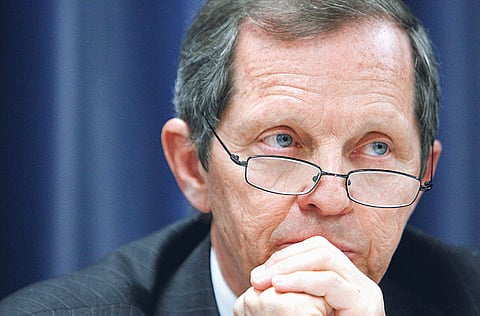IATA urges governments to unite in support of climate efforts
Aviation industry seeks 1.5% annual fuel efficiency improvement

Geneva: The International Air Transport Association (IATA) on Saturday called on the world's governments to unite in support of aviation's ambitious targets to offset climate change and agree to a global approach at the upcoming International Civil Aviation Organisation's (ICAO) Triennial Assembly in Montreal.
"The past 18 months have been the worst financial times in modern aviation history. But even in these harsh times, airlines' budgets earmarked for environment projects were not cut. The numbers tell the story. In the next 10 years, the industry will spend $1.3 trillion (Dh4.7 trillion) for 12,000 new aircraft. Each of these will be 20 to 25 per cent more fuel-efficient than their predecessors," Giovanni Bisignani, IATA's Director General and CEO, said at the Aviation and Environment Summit being held in Geneva by the Air Transport Action Group (Atag).
The global aviation industry is united behind three targets to address climate change: a 1.5 per cent average annual improvement in fuel efficiency to 2020, capping net emissions from 2020 with carbon-neutral growth, and cutting net emissions in half by 2050 compared to 2005. To achieve these targets, the aviation industry is also united on a four-pillar strategy: investing in new technology, more efficient infrastructure, more effective operations and positive economic measures.
Bisignani highlighted that sustainable biofuels are making great progress and moving closer to certification for commercial use. Five airlines have already tested flights using sustainable biofuels and four more tests are expected before the end of the year, he said. "With certification expected within months, distribution and commercialisation are the challenge. It is in the self-interest of every government to get much more involved and support the commercialisation of biofuels with incentives to facilitate the needed investments," he said.
Bisignani took note of the timing of the 37th ICAO Assembly, which opens on September 28. "We cannot meet our ambitious targets without the support and cooperation of governments. Aviation is a global industry. We need a global framework under ICAO to guide our efforts.
Aggressive targets
"The ICAO Assembly is our best opportunity to achieve this in time for COP-16 in Cancun. Political obstacles being removed, the industry is committed to aggressive targets and our track record demonstrates that we will achieve them. Supporting aviation's efforts should be an easy decision for governments to make in Montreal," he said.
The significant progress witnessed at the United Nations Framework Convention on Climate Change (UNFCCC) since the Copenhagen meeting would help facilitate an agreement at ICAO, he said.
Christiana Figueres, the new Executive Secretary of the UNFCCC who took charge in May, is working with the industry to achieve solutions. In a speech to the summit delegates, she welcomed the aviation industry's proactive targets and re-iterated the importance of a government agreement on international aviation emissions at the ICAO Assembly.
Figueres maintained that ICAO's principle of universality for aviation would not conflict with, or compromise the UNFCCC's principle of common but differentiated responsibility (CBDR) in non-aviation issues, and recognised the need for a global approach to economic measures to ensure that aviation continues to deliver social and economic benefits while avoiding a patchwork of conflicting and potentially overlapping national and regional policies which would adversely affect the industry.
"The willingness of the UNFCCC to constructively engage and challenge the industry is a new and much welcomed approach.
Sign up for the Daily Briefing
Get the latest news and updates straight to your inbox



